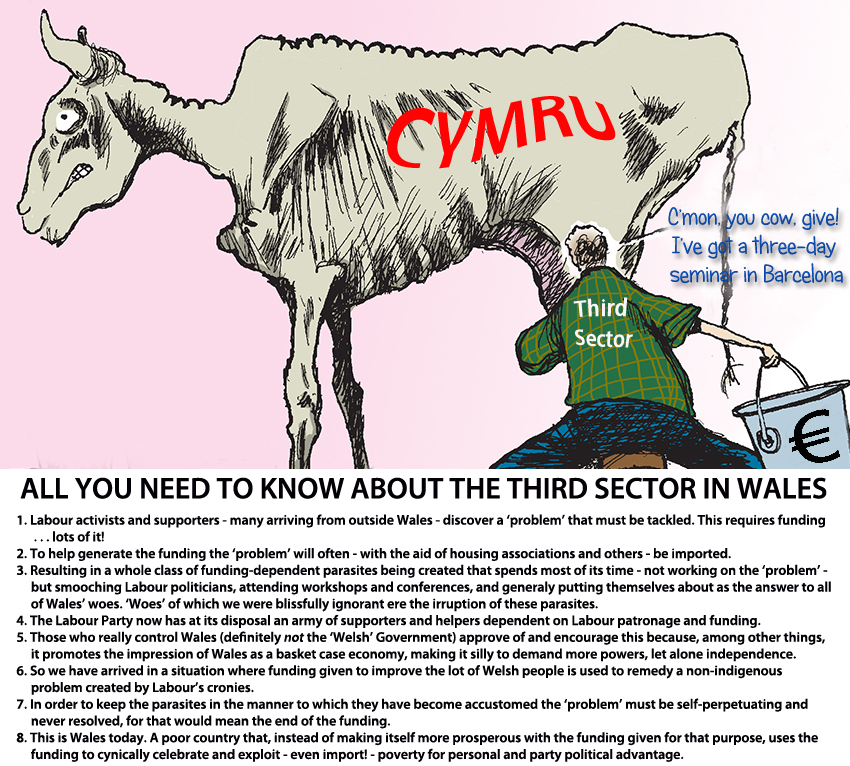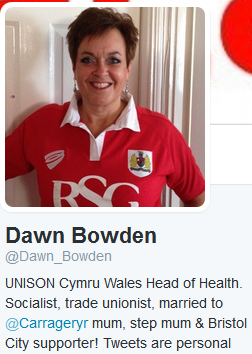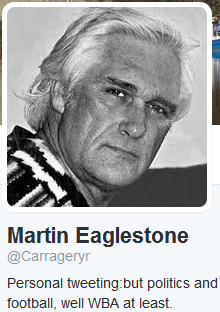
The ‘milking’ referred to is done by the Third Sector, that demi-monde wherein dwell ‘Welsh’ Labour’s kept women (and a few men), serving no purpose beyond diverting public money from better use and performing all manner of despicable acts for those who own them. Perhaps it was ever thus, but since the arrival of devolution, and the recognition by our continental cousins of our relative poverty, what had once been a cottage industry of home-grown Labour nepotism and corruption has expanded into a pseudo-economy.
A few years back I started looking into the Third Sector and its relationship with ‘Welsh’ Labour, and in that time certain features have become obvious. Chief among them, that we now have a whole sector of Welsh life dependent upon Labour Party patronage in the form of funding and preferment, which those belonging to this sector repay by promoting the Labour message and by attacking Labour’s political opponents. This client class has become the Japanese knotweed of Welsh life – invasive, destructive, of no use to anyone (other than Labour), and damaging to the wider environment. We should be rooting it out, but it won’t be done because ‘Welsh’ Labour, losing support among the native electorate, is becoming ever more dependent on this monster it has introduced.
One obvious manifestation of Labour losing support is its inability to recruit decent Welsh candidates. It was this problem that led to the recent fiasco in Swansea when the ‘local’ Labour Party was eventually taken over by people who were strangers to the city. Resulting in the embarrassment of Il Duce Phillips and the student councillors, with their sybaritic lifestyles and complete ignorance of the city they were supposed to be running. A self-inflicted wound caused by Labour offering free party membership to students in Swansea University. Yes, that’s how bad it has become for Labour. Something else illustrated by this episode is Labour’s worrying links with certain trade unions, the National Union of Students being one, but another worthy of mention is Unison.
*
Now when I were nobutalad – a long time ago I know – trade unions were taken seriously by working class men such as those among whom I grew up. They elected their union representatives, they knew them, and if there was any issue that needed to be discussed then they could have it out with them, at union meetings or even down the pub or club. It was the trade unions, more than anything else, including the Labour Party, that defended their interests. All that is gone. After countless mergers and a dramatic fall in union membership we are left with a few big unions run by professional union officials, mirroring the professional politicians, all equally divorced from real life.
As mentioned, one such union is Unison, and one of its full-time officials is Dawn Bowden of Bristol Cardiff, who is tipped to become Labour’s candidate for Caerffili or Islwyn (depending on whether there’s a gender fix) in next year’s elections to the Notional Assembly. Quite how long she’s lived in Wales is uncertain, but she’s loyal to the Labour Party and belongs to that union which is almost ‘Welsh’ Labour by  another name, so that’s her elevation assured.
another name, so that’s her elevation assured.
Her Twitter account says that she is married to @Carrageryr, so who might that be? Well, it’s another Labour Party star named Martin Eaglestone, perennial Labour loser in Arfon. (Eaglestone, Carrageryr, geddit?) Though in past elections he was living with his wife and five children in Y Felinheli. (I blame all these conferences they go to, and the drinking.) Eaglestone’s Linkedin profile describes him as, “Welsh Policy Officer at Labour Party – Welsh Labour”, whatever that means. He supports West Bromwich Albion while Bowden supports Brizzle City, so neither knows much about football.
I single out Unison because this seems to be the union of choice for many Labour politicians in Wales, even those, like Swansea’s student councillors, who’ve never done a day’s work in their lives. In many ways Unison operates (certainly in Wales) as an adjunct to the Labour Party rather than as a trade union in the traditional sense. Maybe Labour’s political opponents should have a new slogan – ‘Vote Labour, get Unison!’. Though the problem is also found in England, with other unions.
*
Returning to the Third Sector, in my delvings a number of things have become apparent, but one that I feel needs to be highlighted is the practice of publicly-funded bodies setting up wholly-owned subsidiaries, for reasons that are not entirely clear, or may even be of dubious probity.
In recent posts I have looked at Canoe Wales, and the extraordinary level of funding that body receives from Sport Wales, £378,000+ in the current financial year alone (see panel below). Yet Canoe Wales has two subsidiaries, C W Sales and Services Ltd and Canoe Wales (Commercial) Ltd. The first of these subsidiaries runs the adult playground at Frongoch, near Bala, while the other is dormant. The representative of Canoe Wales that I spoke with assured me that Canoe Wales’s finances would soon start to improve, and I’m sure he’s right, for seeing as the running of the Frongoch Centre has passed to the subsidiary and Canoe Wales is so well funded it would be strange if Canoe Wales’s books didn’t begin to look healthier. The Canoe Wales representative also told me that his organisation had passed all the auditor’s checks. Which, again, I don’t doubt; but I guarantee that the Wales Audit Office does not look into subsidiaries, for the very simple reason that these do not – directly – receive any public funding.
Allowing publicly-funded bodies to form subsidiaries creates the temptation for an organisation to transfer ‘bad news’ to a subsidiary, safe in the knowledge that the WAO will not investigate the subsidiary. I’m not for one minute suggesting that this is what has recently happened with Canoe Wales, but C W Sales and Services Ltd is not in a healthy financial state. If C W Sales and Services Ltd did not exist then its indebtedness of £76,798 would be shown against Canoe Wales, and would be picked up by auditors.
That said, it could be that funders are aware of such arrangements. Staying with Canoe Wales, its accounts for year ending March 31 2013 state that “As at 1st April 2013, commercial trading activities and the operation of the White Water Centre at Canolfan Tryweryn were transferred to C W Sales and Services Limited, a wholly owned subsidiary.” Yet despite this burden being lifted Canoe Wales’ funding from Sport  Wales leapt from £266,000 in 2012/13 to £378,000 in 2013/14 and 2014/15 (click to enlarge). How do we explain this unless Sport Wales is aware of, and approves the use of, a subsidiary that may be beyond the remit of the Wales Audit Office and will – as the clip above reveals – not be mentioned in future Canoe Wales accounts?
Wales leapt from £266,000 in 2012/13 to £378,000 in 2013/14 and 2014/15 (click to enlarge). How do we explain this unless Sport Wales is aware of, and approves the use of, a subsidiary that may be beyond the remit of the Wales Audit Office and will – as the clip above reveals – not be mentioned in future Canoe Wales accounts?
As I say, it’s a phenomenon I have observed regularly in my investigation of how public funding is dished out in Wales. Here’s another example, with a further twist. This example is Carmarthenshire Heritage Regeneration Trust / Ymddiriedolaeth Adfywio Treftadaeth Sir Gaerfyrddin, according to its website, but Ymddiriedolaeth Atgyfnerthu Treftadaeth Sir Gaerfyrddin on the websites of both the Charity Commission and Companies House. Confusing. Maybe deliberately so. Is this a laudable use of yr hen iaith or an attempt to hinder investigation into a body universally known as the Carmarthenshire Heritage Regeneration Trust?
Either way, the Trust has a subsidiary, deep in the red, called CHRT Ventures Ltd. Now for the ‘twist’ I referred to earlier. The chief executive of the Trust is Claire Deacon, and the Trust’s 2012 accounts say this: “During the year, Ymddiriedolaeth Atgyfnerthu Treftadaeath Sir Gar (CHRT) employed the services of Ms Claire Deacon, CEO, a historic building consultant. The total expenses paid by CHRT for consultancy was £59,159 (2012: £41,873). At the year end, CHRT owed Ms Claire Deacon £9,436 (2012: £3,386). This balance is included in trade creditors”. How the hell can an employee suddenly declare herself a consultant to the body she works for and then demand more than she would have been paid in salary? The full story of Ymddiriedolaeth Atgyfnerthu Treftadaeth Sir Gaerfyrddin, and more, can be found here
Here’s another example, this one from the fleece jacket sector. The issue of public funding and subsidiaries, with the added problem of Welsh public funding seeping across the border, even extends into academe, as this post explains. And how could anyone forget Naz Malik and Awema? Let us remember that the Malik family was staunch Labour, with father and son hoping to be Labour candidates. To help their cause Naz Malik would regularly sing for his supper by proclaiming against ‘racist (Welsh) nationalists’. And what the hell is happening at the YMCA? Then there’s housing associations. We are told by the ‘Welsh’ Government that 22 local authorities is far too many, too expensive, and so there must be ‘streamlining’ – so why is that same ‘Welsh’ Government funding dozens and dozens of housing associations that compete with each and duplicate each other’s work? The answer is that housing associations are stuffed with Labour supporters (and future candidates). Read about it here.
*
There are countless other examples of Third Sector bodies, publicly-funded agencies, etc., ‘diversifying’, or setting up subsidiaries and ‘trading arms’ into which ’embarrassments’ can be diverted, beyond the scope of auditors mandated only to check the recipient body itself. Though what happens if one of these subsidiaries actually makes a profit, will the profit be declared to the funding body?
This loophole is known to those disbursing the funding and is almost certainly familiar to those entrusted with ensuring that the funding can be properly accounted for. Which raises the question, why is this loophole not closed? The suspicion must be that it’s left  open in order to help hide some of the public funding being wasted by the Third Sector. Because to expose this waste would damage both the Third Sector and the Labour Party, and they need each other, their fortunes and their futures are intertwined.
open in order to help hide some of the public funding being wasted by the Third Sector. Because to expose this waste would damage both the Third Sector and the Labour Party, and they need each other, their fortunes and their futures are intertwined.
We have on our hands a sick man called the ‘Welsh’ Labour Party or, if we go by Eaglestone’s Linkedin profile, “Labour Party – Welsh Labour”. (Perhaps the ‘Welsh’ Labour Party is as much a fiction as the ‘Wales Green Party’.) This party is no longer able to find decent candidates from within the nation so it has to rely on recruiting officials imported by its trade union partners and those who have swarmed here to make careers for themselves out of celebrating and exaggerating Wales’ deprivation in order to get their sweaty paws on the money that has been given to alleviate that deprivation.
The Labour Party, with all its hangers-on and cronies, is suffocating Wales. Unpatriotic, anti-initiative, increasingly dependent for its survival on people who don’t know Wales and don’t care about Wales, it can only maintain its position because there is no other party electors find more attractive. Which is why I repeat that Plaid Cymru has fifteen months (the General Election of May 2015 and the Assembly elections of May 2016) to prove that it can mount a serious challenge to Labour; if it fails, yet again, then we must have a new nationalist party, a party that puts Wales and Welsh people first, rather than one that constantly exposes its weaknesses and lack of ambition by looking to do deals with anti-Welsh parties. Fifteen months.


